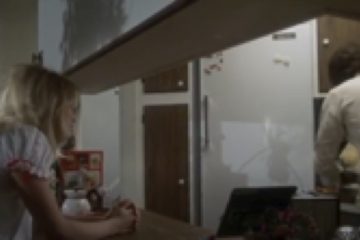Shampoo (1975) is a “lucid moral disaster, with resemblances of comedy and confusion” (Lennon 2005:11) that depicts the life of hairdresser, George, who is struggling with his lustful habits towards clients. One of the main themes running throughout the film is the conflict of traditional gender identity that exists within George himself. We observe a character working in a female dominated industry, with flamboyant, bouncy hair and tight clothing whilst, simultaneously, having an underlying playboy status. These ideas are mainly shown through the mise-en-scene presented in the film, including in one of the final scenes where we witness a change in gender identities as Jill confronts George regarding his infidelity. George’s masculinity is breaks down in this scene as he finally seems to accept what he wants in life instead of focusing on which client he can have sex with next.
The scene takes place after George’s infidelity to Liz has been revealed. We see George finding his place within his gender, as he no longer has to put on an act of being a ladies’ man to cover up his insecurities, finally enabling him to show his true feelings. The scene opens with Jill arriving at her apartment, and as she comes down the stairs we see a close-up shot of George. His hair is a mess and he is wearing his clothes from the previous night. For a character whose personality is mainly based around hair and good looks this dishevelment transparently foreshadows his downfall as a character. In some ways this increases his masculinity by producing a rougher look. However, he’s also lost confidence which is the key to his free love attitude. George’s character mirrors the actor’s personality himself, Warren Beatty who was known as quite a ladies’ man therefore, pushing the ideologies of his character whilst helping the audience grasp the blurred morals that stand between his characters perception and his own.

One of George’s masculine traits is his size and height. In most shots throughout the film, he towers over women. It is almost like he doesn’t fit in the frame (Figure 1). Metaphorically speaking, this signifies how George doesn’t fit in his life and doesn’t know where he belongs. Initially he seems to use this dislocated identity to his advantage. For example, his sexuality is questioned explicitly throughout the film multiple times and he uses this to his advantage as he seduces his clients whilst simultaneously listening to their problems. When Jill asks how many girls George has slept with he sits down, indicating his vulnerability as Jill towers over him, creating a role reversal within the genders (Figure 2).

Even though this scene is extremely tense it’s lit brightly implying that George’s honesty is a form of hope. George fits in this frame perfectly, he is being truthful for the first time, through his directness we become confused, because we are seeing a troubled character open up and become vulnerable.
George subsequently stands back up, regaining his masculine stance and saying “I don’t know what I’m apologising for” spiraling into a monologue attempting to justify his actions. It is clear that he is mentally having a conversation with himself. However, this mirrors what the other characters display: selfishness. They are all so wrapped up in themselves that they don’t think of anyone else or the society around them. This is evident through the setting of the film, election day. However, despite being set on this day it is telling that the characters attend two election parties but no one votes, nor does anyone (with the exception of Lester) talk about the election thereby conveying how the characters largely avoid engaging with the real world. The film is not only a light-hearted comedy, but it also is a reflection on a time where people had withdrawn from engagement with politics and society, reminding the viewers how they got themselves in the position where Nixon ended up becoming president.

We are finally shown Jill standing up for herself within the scene, the roles are reversed women are no longer running after George. In fact, he has no one left: his worst fear has come true. The composition of the shot reverse shot is used in this scene to build up tension between the two characters, Jill doesn’t say much in this sequence but she expresses an awful lot through her facial expressions (Figure 3). She doesn’t pick a fight, she is calm and just wants answers, she comes across like a mature strong independent woman. This contrasts with Jill earlier in the film. For example, when she finds another woman’s earring in George’s bed, she stays silent. The juxtaposition between the characters is extremely prominent in this scene. For example, Jill’s hair and costume looks very “put together” compared to George’s, even though they have both had an extremely overwhelming night. Her role as a woman has become stronger through George’s lies and she stands up for herself, realising that she deserves better. Her facial expression indicates amazement as she listens to George’s excuses almost like she can’t believe what he is saying, and she conveys to him and the audience that she understands that she is worth more than what he is going to give her. The mise-en-scene here quietly conveys her strength and understanding, which is extremely relevant to the changing role of women in the late sixties.
Shampoo shows multiple conflicts with gender throughout this specific scene and the film as a whole. George finds where he stands within his relationship to women and to society as a whole whilst, on the other hand, we are able to witness women such as Jill become strong enough to stand up to and reject men like George. This ultimately makes George come to the realization that he is a little too late in finding what true love really is.
References
Lennon, Elaine (2005) The Edge of Melancholy: Shampoo. Sensesofcinema.com. Oct. 2005. Web. Aug. 15 2022.

Milly Dimelow is a BA Hons Film Student at QMUL. Her main passion within her degree is film analysis, presenting multiple ideas through one camera angle. She hopes to go into the word of film journalism in the future.
Please obtain permission before redistributing. Copyright © 2022 Milly Dimelow